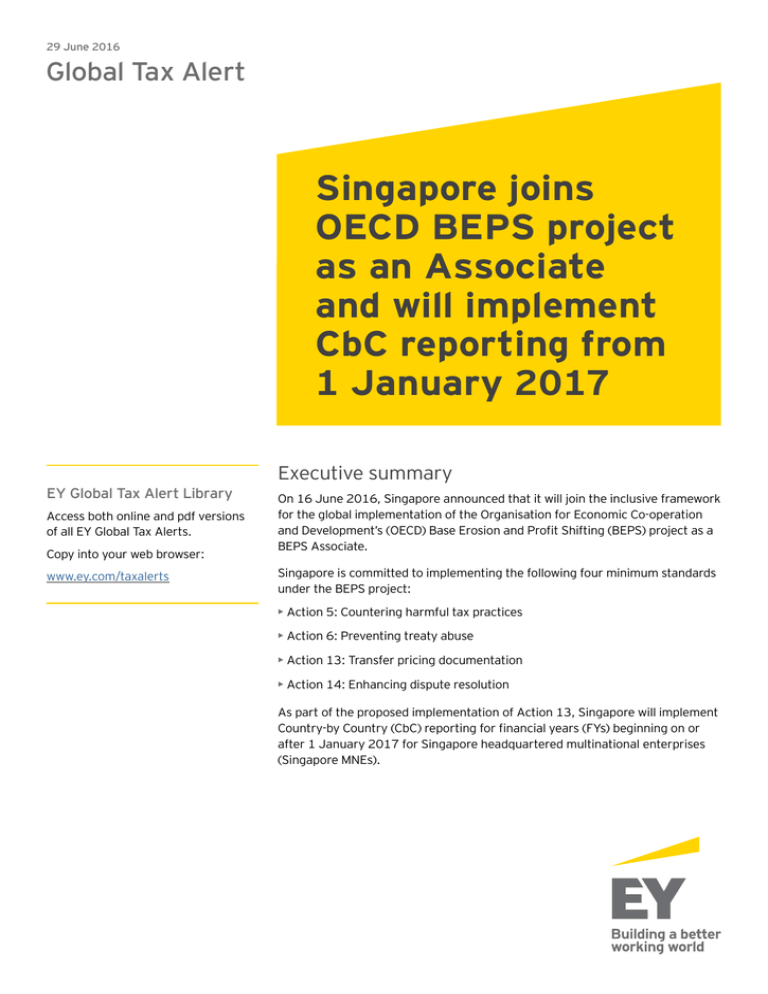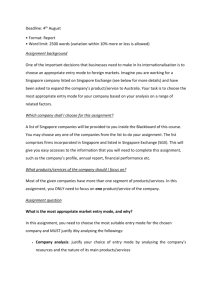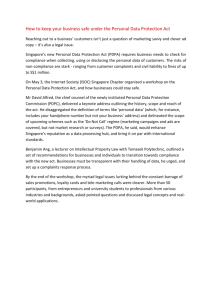
29 June 2016
Global Tax Alert
Singapore joins
OECD BEPS project
as an Associate
and will implement
CbC reporting from
1 January 2017
EY Global Tax Alert Library
Access both online and pdf versions
of all EY Global Tax Alerts.
Copy into your web browser:
www.ey.com/taxalerts
Executive summary
On 16 June 2016, Singapore announced that it will join the inclusive framework
for the global implementation of the Organisation for Economic Co-operation
and Development’s (OECD) Base Erosion and Profit Shifting (BEPS) project as a
BEPS Associate.
Singapore is committed to implementing the following four minimum standards
under the BEPS project:
•Action 5: Countering harmful tax practices
•Action 6: Preventing treaty abuse
•Action 13: Transfer pricing documentation
•Action 14: Enhancing dispute resolution
As part of the proposed implementation of Action 13, Singapore will implement
Country-by Country (CbC) reporting for financial years (FYs) beginning on or
after 1 January 2017 for Singapore headquartered multinational enterprises
(Singapore MNEs).
2
Global Tax Alert
Detailed discussion
Singapore’s positions on the four BEPS minimum
standards
1.
Countering harmful tax practices. Singapore uses tax
incentives to promote investment in certain areas of the
economy, where tax incentives are legislated and granted
for defined periods of time on qualifying activities.
Incentive recipients would need to have substantive
operations in Singapore as well as contribute meaningfully
to the growth of the overall economy. Accordingly, no
significant changes are expected to Singapore’s existing
incentive regimes, but the authorities will continue
to review existing incentives and rules to ensure they
remain relevant and competitive.
Taxpayers should be prepared for increased scrutiny
to ensure adherence to incentive conditions. It is also
important to note that five categories of taxpayerspecific rulings have been identified in the Action 5
report for compulsory information exchange between
tax administrations and which are very broad, including
in particular, rulings on preferential regimes.
2.
Preventing treaty abuse. Singapore does not condone
treaty shopping and has a number of income tax treaties
(treaties) that contain anti-treaty shopping provisions
to prevent abuse. The Government is currently part of
a group of jurisdictions working together to develop a
multilateral instrument for incorporating BEPS measures
into existing treaties to counter treaty abuse. Singapore
will consider whether to join the instrument after it is
finalized.
3.
Transfer pricing documentation. Singapore adheres to
the internationally agreed arm’s length principle and will
be committed to the implementation of CbC reporting.
More details are discussed below.
4.
Enhancing dispute resolution. The Inland Revenue
Authority of Singapore (IRAS) has been active in engaging
foreign tax authorities to resolve cross border tax disputes
through the mutual agreement procedure provided
in its treaties. Singapore will work closely with other
jurisdictions to monitor the implementation of minimum
standards on dispute resolution developed under the
BEPS project. Besides complementing the other BEPS
minimum standards, this will also ensure that taxpayers
have access to effective and expedient dispute resolution
mechanisms under treaties.
Action 13 and implementation of CbC reporting
On 6 January 2015, the IRAS released revised transfer
pricing guidelines followed by further revisions issued in
January 2016.1 The revisions included a requirement to
prepare contemporaneous transfer pricing documentation,
including group level information and entity level information
broadly in line with the Master File and Local File concepts of
the OECD Guidelines (having been revised to incorporate the
BEPS Action 13 report).
Implementation of CbC reporting will commence for FYs
beginning on or after 1 January 2017 for Singapore MNEs
whose group revenue exceeds S$1,125m (broadly equivalent
to US$850m or €750m). The Singapore MNEs are required
to file the CbC reports with the IRAS within 12 months from
the close of their FYs.
The IRAS will exchange CbC reports with jurisdictions that
Singapore has entered into bilateral agreements with for
automatic exchange of CbC reporting information, provided
the following conditions are met:
•These jurisdictions have a strong rule of law and can
facilitate the confidentiality of the information exchanged
and prevent its unauthorized use.
•There must be reciprocity in terms of the information
exchanged.
The IRAS will consult with Singapore MNEs further on the
implementation details of CbC reporting, and release these
details by September 2016.
The following clarifications will be required:
•Master File and Local File: Singapore’s transfer pricing
guidelines already include a requirement to prepare
contemporaneous transfer pricing documentation including
group level information and entity level information.
It remains to be seen whether the Singapore Government
will further update Singapore’s transfer pricing guidelines
to require Singapore MNEs to include the group level
information in a separate Master File document that can
be shared under exchange of information.
•Manner of filing information: It is expected that the IRAS
will implement the OECD’s standardized electronic format
for the exchange of CbC reports between jurisdictions called
CbC XML Schema as a preferred or mandated format for
the submission of data.2
Global Tax Alert
•Inclusion of a secondary reporting mechanism: The
current announcement from Singapore’s Ministry of
Finance indicates that CbC reporting would be required
for Singapore MNEs. This may suggest that there will be
no secondary mechanism requiring MNEs headquartered
outside Singapore to file CbC reports separately in
Singapore. However, until further guidelines are issued,
this issue remains uncertain.
•Surrogate filing location: The final BEPS Action 13 report
recognizes and provides for “surrogate filing location,”
under which one entity of the MNEs can designate a group
company to act as a “surrogate parent” entity and file
on behalf of the entire group. It may not be possible for
an MNE headquartered outside Singapore to nominate
Singapore as a surrogate filing location, but further
guidance will be necessary to clarify the position.
•Implementation date: CbC reporting will be implemented
in Singapore for FYs beginning on or after 1 January
2017. This is 12 months later than the original intention
of the OECD and 12 months later than implementation in
other countries. Certain countries have secondary filing
3
mechanisms in place, which means that Singapore MNEs
may be required to prepare and file CbC reports in these
overseas countries for FY 2016, regardless of the rules
coming into force in Singapore from FYs beginning on or
after 1 January 2017. For this reason, it is recommended
that Singapore MNEs monitor requirements not just in
Singapore but also in overseas countries.
Implications
With respect to the four minimum standards, taxpayers will
need to wait to see whether Singapore will enact the changes
to be introduced or only publish guidelines to bring the
changes into effect. An alternative could be that Singapore
may only bring in changes to introduce CbC reporting in the
current guidelines, since the other minimum standards are
already in the current tax legislation.
Singapore may also introduce changes in the Master File
and Local File content to be in line with the CbC reporting
regulations. Further clarification in the detailed guidelines
is expected in September 2016.
Endnotes
1. See EY Global Tax Alert, Singapore Tax Authority releases updated transfer pricing guidelines, dated 8 January 2015.
2. See EY Global Tax Alert, OECD releases Country-by-Country reporting XML Schema and related User Guide, dated
25 March 2016.
4
Global Tax Alert
For additional information with respect to this Alert, please contact the following:
Ernst & Young Solutions LLP, International Tax Services, Singapore
•
•
•
•
•
Chung-Sim Siew Moon
Chester Wee
Desmond Teo
Tan Ching Khee
Jerome van Staden
+65 6309 8807
+65 6309 8230
+65 6309 6111
+65 6309 8358
+65 6309 6386
siew-moon.sim@sg.ey.com
chester.wee@sg.ey.com
desmond.teo@sg.ey.com
ching-khee.tan@sg.ey.com
jerome-van.staden@sg.ey.com
Ernst & Young Solutions LLP, Transfer Pricing Services, Singapore
•
•
•
•
•
Luis Coronado
Henry Syrett
Stephen Lam
Stephen Bruce
Jonathan Belec
+65 6309 8826
+65 6309 8157
+65 6309 8305
+65 6309 8898
+65 6309 6175
Ernst & Young LLP, Singapore Tax Desk, New York
• Stella Teo
+1 212 773 3647
Ernst & Young LLP, Asia Pacific Business Group, New York
• Chris Finnerty
• Kaz Parsch
• Bee-Khun Yap
+1 212 773 7479
+1 212 773 7201
+1 212 773 1816
Ernst & Young LLP, Asia Pacific Business Group, Houston
• Trang Martin +1 713 751 5775 luis.coronado@sg.ey.com
henry.syrett@sg.ey.com
stephen.lam@sg.ey.com
stephen.bruce@sg.ey.com
jonathan.belec@sg.ey.com
stella.teo1@ey.com
chris.finnerty@ey.com
kazuyo.parsch@ey.com
bee-khun-yap@sg.ey.com
trang.martin@ey.com
EY | Assurance | Tax | Transactions | Advisory
About EY
EY is a global leader in assurance, tax, transaction
and advisory services. The insights and quality
services we deliver help build trust and confidence
in the capital markets and in economies the world
over. We develop outstanding leaders who team to
deliver on our promises to all of our stakeholders.
In so doing, we play a critical role in building a better
working world for our people, for our clients and for
our communities.
EY refers to the global organization, and may refer to
one or more, of the member firms of Ernst & Young
Global Limited, each of which is a separate legal entity.
Ernst & Young Global Limited, a UK company limited
by guarantee, does not provide services to clients.
For more information about our organization, please
visit ey.com.
© 2016 EYGM Limited.
All Rights Reserved.
EYG no. 01807-161Gbl
1508-1600216 NY
ED None
This material has been prepared for general informational
purposes only and is not intended to be relied upon as
accounting, tax, or other professional advice. Please refer
to your advisors for specific advice.
ey.com




